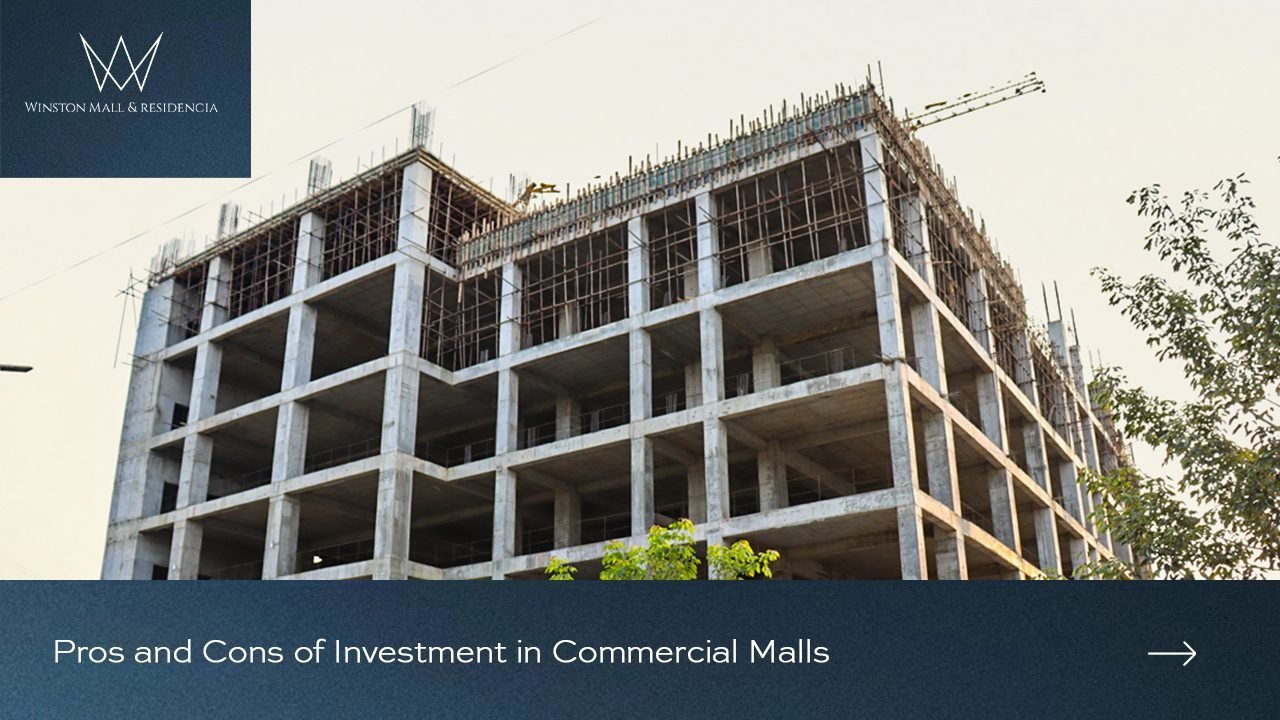Table of Contents
ToggleIntroduction
In Pakistan, commercial malls have emerged as a popular investment option for individuals and businesses alike. These sprawling structures, housing an array of retail outlets, eateries, and entertainment venues, have become integral to the urban landscape. However, like any investment opportunity, investing in commercial malls comes with its own set of advantages and disadvantages. In this blog post, we’ll delve into the pros and cons of investing in commercial malls, providing you with a comprehensive understanding to help you make an informed decision.
Pros of Investing in Commercial Malls
1. Stable and Recurring Income
One of the most compelling advantages of investing in commercial malls is the potential for a stable and recurring income stream. Malls typically house numerous tenants, ranging from anchor stores to smaller boutiques, all paying rent on a monthly or yearly basis. This diversified tenant mix helps mitigate the risk of vacancy and ensures a consistent cash flow for investors.
2. Appreciation in Value
Commercial malls tend to appreciate in value over time, especially in prime locations and emerging urban centers. As the surrounding area develops and the mall attracts more foot traffic, the property’s value increases, making it a potentially lucrative long-term investment.
3. Captive Consumer Base
Malls offer a unique advantage – a captive consumer base. By providing a one-stop-shop experience with a variety of retail, dining, and entertainment options, malls attract a steady stream of visitors. This captive audience translates into potential customers for the tenants, ensuring a consistent demand for the mall’s offerings.
4. Diversification Opportunities
Investing in commercial malls allows for diversification within the real estate sector. While residential properties may be subject to market fluctuations and demographic shifts, commercial malls cater to a broader consumer base, offering a hedge against these risks.
Cons of Investing in Commercial Malls
1. High Initial Investment
Developing or acquiring a commercial mall typically requires a substantial upfront investment. Land acquisition, construction costs, and the necessary infrastructure can be incredibly capital-intensive, making it a challenging proposition for individual investors with limited resources.
2. Management and Maintenance Complexities
Managing and maintaining a commercial mall is a complex endeavor. From overseeing tenant relations and lease negotiations to ensuring the property’s upkeep and adherence to safety and regulatory standards, investors must be prepared to tackle a multitude of tasks or hire professional management teams, adding to the overall cost.
3. Competition and Oversaturation
In major cities and urban centers, the commercial mall market can become oversaturated, leading to intense competition for tenants and customers. This can result in higher vacancy rates, reduced rental income, and potential losses for investors.
4. Evolving Consumer Preferences
With the rise of e-commerce and changing consumer preferences, traditional brick-and-mortar retail establishments face challenges. Malls that fail to adapt and evolve with these shifting trends may struggle to attract and retain tenants, impacting their profitability.
Conclusion
Investing in commercial malls can be a lucrative endeavor, offering stable income streams, appreciation in value, and diversification opportunities. However, it also comes with significant financial commitments, management complexities, and the risk of oversaturation and evolving consumer preferences. Ultimately, the decision to invest in commercial malls should be based on a thorough evaluation of your financial capabilities, risk tolerance, and a comprehensive understanding of the local market dynamics.
Introducing Winston Mall – A Promising Investment Opportunity
If you’re considering investing in a commercial mall, Winston Mall, located in the prime B-17 sector of Islamabad, presents an exciting opportunity. Developed by Winston Builders, a reputable and experienced builder in Pakistan, Winston Mall is poised to become a landmark destination in the heart of the capital city.
Winston Mall boasts a strategic location, seamless connectivity, and a diverse tenant mix catering to a wide range of consumer preferences. With its modern architecture, ample parking facilities, and a focus on providing an exceptional shopping and entertainment experience, Winston Mall is designed to attract a steady stream of visitors from across the region.
Winston Builders has a proven track record of delivering high-quality projects and is committed to ensuring Winston Mall’s success through meticulous planning, construction, and management. As an investor, you can expect a stable and recurring income stream, potential appreciation in value, and the opportunity to be part of a thriving commercial hub.
FAQs
How do I assess the potential of a commercial mall investment?
Conduct thorough market research, analyze demographic trends, evaluate the competition, and assess the mall’s location, tenant mix, and accessibility factors to gauge its potential for success.
What are the common financing options for investing in commercial malls
Investors can explore traditional bank loans, commercial real estate loans, private equity financing, or form partnerships or joint ventures to raise the necessary capital.
How can I mitigate the risks associated with investing in commercial malls?
Diversify your tenant mix, implement effective marketing and promotional strategies, stay attuned to consumer trends, and maintain a strong property management team to minimize risks.
What are the typical lease terms for tenants in commercial malls?
Lease terms can vary, but anchor tenants often secure longer leases (10-20 years), while smaller tenants may have shorter leases (3-5 years) with renewal options.
How do I ensure a steady stream of visitors to the mall?
Implement strategic marketing campaigns, host events and promotions, ensure a diverse mix of tenants catering to various consumer segments, and prioritize a convenient location with ample parking and accessibility.

